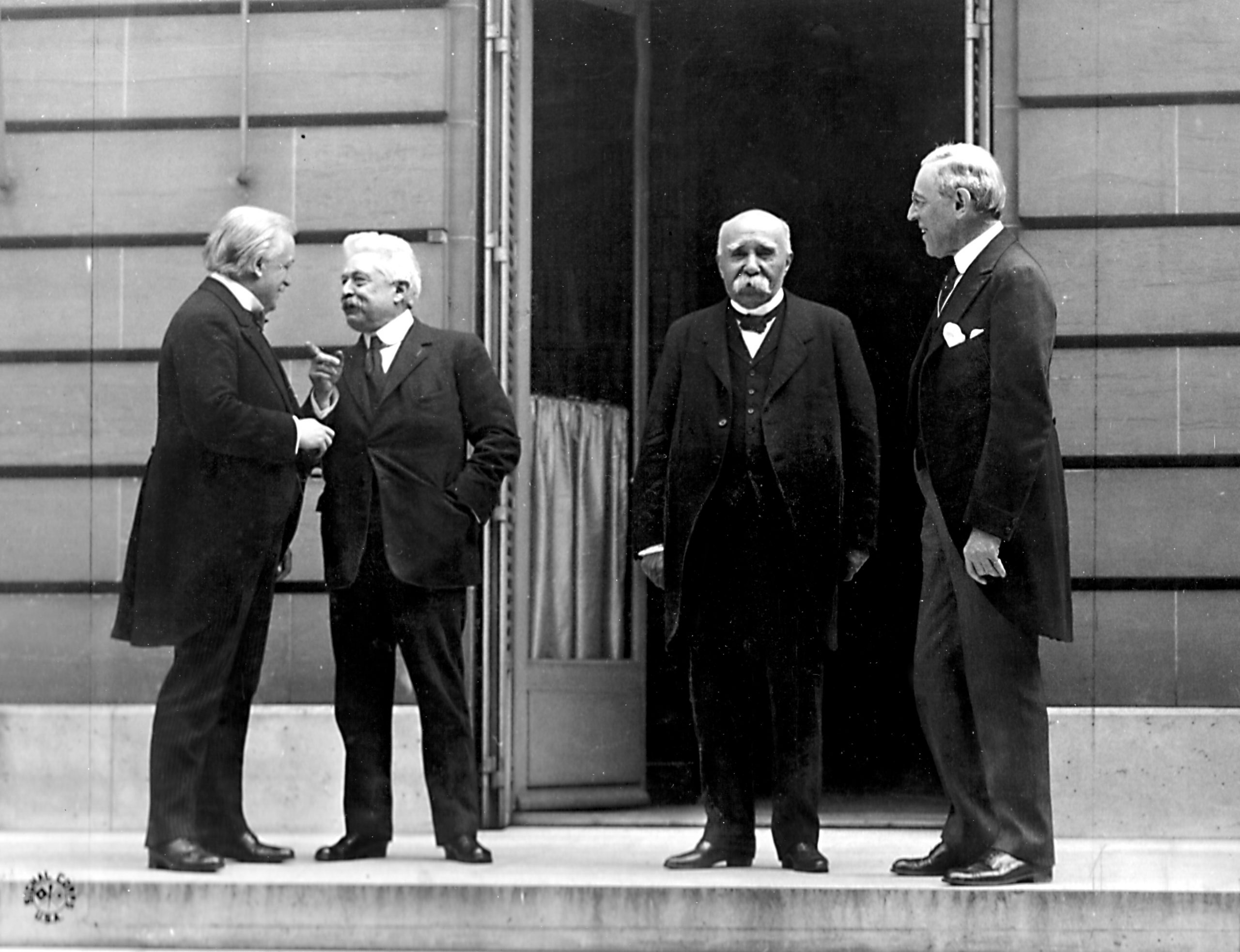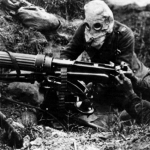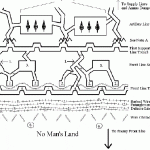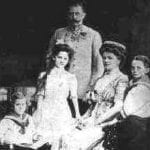The following article on Woodrow Wilson and World War 1 is an excerpt from H.W Crocker III’s The Yanks Are Coming! A Military History of the United States in World War I. It is available for order now from Amazon and Barnes & Noble.
Woodrow Wilson was not an obvious war leader. For one thing, he professed not to know what the war was about. He asked the Cincinnati Women’s City Club in 1916, “Have you ever heard what started the present war? If you have, I wish you would publish it, because nobody else has, so far as I can gather. Nothing in particular started it, but everything in general.”
Wilson entered the White House a foreign policy novice. After winning election as president in 1912, Wilson confided to a friend, “It would be an irony of fate if my administration had to deal with foreign problems, for all my preparation has been in domestic matters.” Even after Europe plunged into war, Colonel Edward M. House, one of Wilson’s closest personal advisors, lamented that the president was “singularly lacking in appreciation of the importance of this European crisis. He seems more interested in domestic affairs, and I find it difficult to get his attention centered upon the one big question.”
THE WAR COMES CLOSER
If Wilson wasn’t “centered upon the one big question,” the Army was, even if it seemed unlikely America would enter the war. In September 1915, the United States Army War College issued a report warning that “The safeguard of isolation no longer exists. The oceans, once barriers, are now easy avenues of approach by reason of the number, speed and carrying capacity of ocean-going vessels. The increasing radii of submarine, the aeroplane, and wireless telegraphy, all supplement ocean transport in placing both our Atlantic and Pacific coasts within the sphere of hostile activities of overseas nations.” The War College report added, “The great mass of the public does not yet realize the effect of these changed conditions upon our scheme of defense.”
To the “great mass of the public” one could perhaps add Woodrow Wilson, though he had scant excuse. Naval guns had sounded in the Western Hemisphere as early as November and December 1914, when British and German ships clashed off the coast of Chile and the Falkland Islands, inflicting casualties of more than 3,500 men. By 1915, the Germans were pursuing a policy of unrestricted submarine warfare, not excepting neutral merchant shipping.
Wilson was nothing if not resolutely neutral. That was his constant refrain. It was endorsed by the majority of Americans, many of whom (especially those of German and Irish heritage) had no desire to join a European war on the side of the British Empire— whatever the Anglophilic sympathies of the educated classes of the South and the East and West Coasts.
STUDYING WAR
Wilson’s appointments to the Navy and War Departments were, on the surface, not equipped for the historical moment. His first choice for secretary of war was a Quaker pacifist, Alexander Mitchell Palmer. When Palmer declined— “As a Quaker Secretary, I should consider myself a living illustration of a horrible incongruity”—angling instead to become attorney general (a position he finally won in 1919), Wilson chose Lindley M. Garrison, a New Jersey lawyer with no military experience. Garrison nevertheless fell out with Wilson over issues of military preparedness. The secretary of war wanted mandatory military training and other reforms that were not popular with Wilson or with Congress. When Garrison resigned in 1916, Wilson replaced him with Newton Baker, a lawyer, former mayor, and suspected pacifist. On the day he was appointed, Baker confessed to reporters, “I am an innocent. I do not know anything about this job.” He was a very Bryan-like appointment.
Baker’s opposite number, the secretary of the Navy, was Josephus Daniels, a newspaperman rather than a Navy man (though his father had been a shipbuilder), a Democrat Party cheerleader, and a Bryanlike populist. He was also another near-pacifist and a temperance agitator who encouraged sailors to drink coffee (hence “a cup of Joe”) rather than rum, and banned alcohol from Navy ships in 1914. An anti–big business populist, he railed against alleged profiteers in private industry and thought the government should have its own steel company to serve the Navy. He also worked, in the democratic style, to reduce officer privileges and improve the lot of the common sailor (aside from denying him a drink).
With Europe engulfed in an all-consuming war, Wilson’s cabinet was stocked with men who on the whole would rather have been smashing whiskey barrels than smiting the Hun. At their head, of course, was the liberal, progressive Woodrow Wilson, who had been a college professor, president of Princeton, and governor of New Jersey. Of earnest Presbyterian clerical stock, he was upright, ambitious, determined, and more than a tad self-righteous. He found it hard to see the other chap’s point of view and could not easily engage or get on with people who disagreed with him (as president, he used Colonel House as his emissary to tiresome opponents). While Wilson, a Virginian, played the Southern gentleman with women, he was certainly no Southern bravo happiest with horse and gun. He did not pine for the Lost Cause; he thought the South was better off for having lost the war; and he held no reactionary ardor for states’ rights—indeed, he believed in a strong central government.
Most of all, Wilson believed in progress; he was in favor of democracy, meritocratic individualism, and government accountability, which he thought was obscured by America’s system of constitutional checks and balances. He much preferred a parliamentary system, or at least a more active executive branch. He proclaimed himself a liberal Jeffersonian in his belief in the people, a conservative Burkean in his disdain for ideology, and a democratic friend of the aspiring classes in his support of government intervention to protect small entrepreneurs from being stifled by corporate business power.
“Self-possession” and “calmness of thought” were so important to Wilson that he reiterated them in January 1915 in his Jackson Day speech to his fellow Democrats, asking, “Do you not think it likely that the world will sometime turn to America and say, ‘you were right and we were wrong. You kept your head when we lost ours . . . now, in your self-possession, in your coolness, in your strength, may we not turn to you for counsel and assistance?’” Whatever the benefits of Wilson’s “coolness” and “strength,” they did not advance the cause of peace; Europe did not think it needed a marriage counselor.
Wilson was not done, however; in that same speech, he set out an even grander, if still nonbelligerent, role for America. “May we not look forward to the time when we shall be called blessed among the nations, because we succored the nations of the world in their time of distress and dismay? I for one pray God that that solemn hour may come. . . . I thank God that those who believe in America, who try to serve her people, are likely to be also what America herself from the first hoped and meant to be—the servant of mankind.”
With the Great War now consuming Europe, Wilson cast himself as professor in chief, with a sheaf of lecture notes on the theory and practice of neutrality. On 19 August 1914, three days before the British Expeditionary Force arrived in France, Wilson admonished his fellow citizens that neutrality meant more than the U.S. government not favoring any of the belligerent powers. Neutrality was the responsibility of every American who needed to strive to be “impartial in thought as well as in action.” Wilson put special emphasis on “what newspapers and magazines contain, upon what ministers utter in their pulpits, and men proclaim as their opinions on the street.” If any doubted that a president of the United States should be dictating what people thought, said, and wrote, Wilson was quick to offer that such uniform neutrality of conscience and deed was necessary to make the United States “truly serviceable for the peace of the world.”
In September 1914, Theodore Roosevelt expressed a different view: “President Wilson has been much applauded by all the professional pacifists because he has announced that our desire for peace must make us secure it for ourselves by a neutrality so strict as to forbid our even whispering a protest against wrong-doing, lest such whispers cause disturbance to our ease and well-being. We pay the penalty for this action—or rather, supine inaction—by forfeiting the right to do anything on behalf of peace for the Belgians at present.” To Roosevelt, Belgium was the war’s “guiltless” victim; Wilson was America’s gutless president. “Wilson,” Roosevelt concluded, “is almost as much of a prize jackass as Bryan.” “The President, unlike Mr. Bryan,” Roosevelt noted, “uses good English and does not say things that are on their face ridiculous. Unfortunately his cleverness of style and his entire refusal to face facts apparently make him believe that he really has dismissed and done away with ugly realities whenever he has uttered some pretty phrase about them.”
“TOO PROUD TO FIGHT”
Wilson made no protest at German atrocities in Belgium. Through privately pro-British and anti-German, he followed his own advice, trying to be neutral in thought, word, and deed, and to convince himself that the war need not touch America—though of course it did, immediately. In terms of trade and finance, the war was a potential boon to the American economy.
At the war’s outset, Britain had imposed a partial blockade of Germany. British foreign minister Sir Edward Grey was solicitous of American opinion and tried to fend off French and Russian calls for a tighter blockade. When cotton, for instance, was added to the list of contraband that could not be shipped to Germany, he had Britain buy American cotton. The partial blockade became a full blockade only after Germany, on 4 February 1915, declared a U-boat war against merchant ships in the waters surrounding Britain and Ireland, a bit of undersea sabre-rattling that even the Wilson administration felt compelled to denounce as an act “unprecedented in naval warfare.” The administration warned that if American lives and ships were lost, “the United States would be constrained to hold the Imperial German Government to a strict accountability.” If this was a threat of war, the German government discounted it, given Wilson’s manifold protestations in favor of peace, neutrality, coolness, and self-possession.
Nevertheless, American foreign policy seemed to be sliding in an almost inevitable pro-Entente direction, despite America’s professed neutrality. At first, at Bryan’s urging, Wilson agreed to ban loans to the combatant nations of Europe—a policy driven both by the Democrats’ suspicion of Wall Street and by Bryan’s denunciations of finance as the grease of war. But the ban soon unraveled, and multimilliondollar loans joined trade in tying America to Britain and France.
German submarine commanders had been secretly advised to avoid striking American-flagged ships; German torpedoes nevertheless exploded through the hulls of American merchantmen carrying oil and grain. In March 1915, the Germans sank a small British passenger ship, killing an American in the bargain. While Wilson believed the American government was obliged to protect its citizens—and dreaded what that might entail—Bryan believed American citizens were obliged not to drag America into war.
This was especially true with regard to the Lusitania. In April 1915, Germany informed the United States that the British luxury liner would be carrying not just passengers from New York to Britain, but munitions for the British army and more than sixty Canadian soldiers. The German government took out an advertisement— approved by Bryan—in the New York newspapers warning Americans not to book passage on the ship. Would-be passengers scoffed at the German threat: on the passenger list were such prominent Americans as the millionaire Alfred Vanderbilt. The Lusitania was big, fast, and could be outfitted with guns as a precaution (though the guns were never mounted). No one showed fear; no one could imagine that the Germans would, in the event, fire on a luxury passenger ship. But off the coast of Ireland on 7 May 1915, a German U-boat launched a single torpedo that sank the Lusitania, killing 1,195 passengers and crew, including 95 children and 124 Americans.
On 10 May, Wilson delivered a speech telling his fellow Americans, “There is such a thing as a man being too proud to fight.” Such a man Woodrow Wilson assuredly was—though Bryan worried that the increasingly pro-British Colonel House and others in the administration were leading the president astray. The secretary of state purported not to see any difference between German U-boats sinking ships loaded with civilian passengers and Britain maintaining its naval blockade of Germany. Wilson did. He demanded Germany apologize for sinking the Lusitania, pay reparations, and “prevent the recurrence of anything so obviously subversive to the principles of warfare.” A month later he added a specific first principle that America would insist upon: “The lives of noncombatants cannot lawfully or rightfully be put in jeopardy by the capture and destruction of an unresisting merchantman.” Bryan thought this far too harsh. It would, he warned, goad Germany into war with the United States. Wilson stuck by it, and Bryan resigned, to be replaced by the much more pro-British Robert Lansing. The Germans, less apoplectic than Bryan, agreed to Wilson’s demands.
Roosevelt blamed the sinking of the Lusitania on the Wilson administration’s lack of big-stick diplomacy earlier in the war and its failure to condemn German atrocities. The Rough Rider colonel railed against Wilson’s “abject cowardice and weakness” and said that the president “and Bryan are morally responsible for the loss of the lives of those American women and children. . . . They are both of them abject creatures and they won’t go to war unless they are kicked into it.” Roosevelt thought America should already be at the side of Britain and France, at least diplomatically, and be prepared for military intervention. German “piracy,” which was “on a vaster scale of murder than any old-time pirate every practiced,” and “the warfare which destroyed Louvain and Dinant” in Belgium, should end any doubts. Roosevelt wrote his son Archie that “Every soft creature, every coward and weakling, every man who can’t look more than six inches ahead, every man whose god is money, or pleasure, or ease, and every man who has not got in him both the sterner virtues and the power of seeking after an ideal, is enthusiastically in favor of Wilson” and his policy of drift, forceless diplomacy, and inaction.
William Jennings Bryan, on the contrary, feared Wilson was far too belligerent. He joined with pacifist congressmen to agitate against military preparedness. He opposed a volunteer officer-training program, paid for by the volunteers, known as the “Plattsburgh Movement” and pushed hard for Congress to prohibit American travel on the merchant ships of combatant powers.
Meanwhile, Americans continued to be killed at sea. In March 1916, a German U-boat sank an unarmed American steamer (the Sussex) without warning. Eighty civilians, some of them Americans, went down with the ship. On 1 April 1916, another American steamer (the Aztec) was torpedoed, and the Wilson administration and the Kaiser’s government replayed their mutual demands and pledges stemming from the sinking of the Lusitania.
“HE KEPT US OUT OF WAR”—BUT BUILT A NAVY
The 1916 Naval Appropriations Act and United States Shipping Board Act proposed to give the United States just that: a Navy bigger than the combined forces of any two other navies and $50 million that would be devoted to building and buying for the Merchant Marine. Though Wilson, trying to be neutral in thought and deed, blamed both “German militarism” and “British navalism” for the calamity of war, he was not a man too proud to indulge in a little navalism himself— and a wee bit of militarism: the 1916 National Defense Act set out an incremental five-year plan to expand the Army to 175,000 men and the National Guard to 400,000.
Wilson campaigned for president in 1916 as “the man who kept us out of war,” and he knew the Naval Appropriations Act put him at odds with much of his party. He supported it anyway, out of wellfounded prudence—to guard not only, or even primarily, against German U-boats, but against the dominance of Britain’s Royal Navy. The United States, rather than Britannia, would rule the waves in the future and ensure the free transport of American goods across the oceans.
It was, as Wilson predicted, conflict at sea that brought America into the war. Reelected in 1916 on the “he kept us out of war” slogan, Wilson began 1917 by announcing his eagerness to negotiate “peace without victory,” a proposal that was inevitably treated with contempt by all sides in the European struggle. On 31 January 1917, Wilson learned that Germany was renewing its policy of unrestricted U-boat warfare. In protest, he severed diplomatic relations with Germany.
The Germans, however, had calculated that they could win the war before the Americans roused themselves to intervene. How could the Kaiser and his generals not sneer when they looked at Wilson: a commander in chief who was too proud to fight, who believed in peace without victory, and who refused to put his Army and Navy on a war footing lest this be thought provocative. Such a man did not impress those who put their trust in “reeking tube and iron shard.” The United States was an Atlantic Ocean away. Its Army was pitifully small and ludicrously ill-equipped. Its most recent major military action had been a punitive expedition against Pancho Villa for raiding across the border into the United States. It might very well have seemed in German eyes that all the U.S. Army was good for was chasing Mexican bandits. As General Erich von Ludendorff said, “What can she do? She cannot come here! . . . I do not give a damn about America.”
Wilson now spoke in favor of “armed neutrality,” which meant arming American merchant ships. That became rather more pressing after the Germans sank the American merchant vessel the Algonquin on 12 March 1917. Three more American merchant ships were sunk less than a week later.
Theodore Roosevelt believed that if America had been prepared for war, Germany would not have been so bold. Writing in March 1917, he fumed that Germany’s policy of unrestricted submarine warfare against neutral shipping was a manifest act of war against the United States and should have been treated as such. Germany, he wrote, “has sunk our ships, our ports have been put under blockade. . . . If these are not overt acts of war then Lexington and Bunker Hill were not overt acts of war. It is well to remember that during the last two years the Germans have killed as many, or almost as many, Americans as were slain at Lexington and Bunker Hill; and whereas the British in open conflict slew armed American fighting men, the Americans whom the Germans have slain were women and children and unarmed men going peacefully about their lawful business.” Instead of recognizing that we were at war with Germany, the Wilson administration was ignobly hiding behind the shelter of Britain’s Royal Navy; the slowing pace of U-boat attacks was “due solely to the efficiency of the British navy. We have done nothing to secure our own safety, or to vindicate our honor. We have been content to shelter ourselves behind the fleet of a foreign power.”
TO MAKE THE WORLD “SAFE FOR DEMOCRACY”
British intelligence handed Wilson the proverbial smoking gun: the transcript of a cable sent on 17 January 1917 from the German foreign secretary Arthur Zimmermann to the German minister in Mexico. Intercepted and deciphered by the British, it read:
On the first of February we intend to begin submarine warfare unrestricted. In spite of this, it is our intention to endeavor to keep neutral the United States of America.
If this attempt is not successful, we propose an alliance on the following basis with Mexico: that we shall make war together and together make peace. We shall give general financial support, and it is understood that Mexico is to reconquer the lost territory in New Mexico, Texas, and Arizona. The details are left to you for settlement.
You are instructed to inform the president of Mexico of the above in the greatest confidence as soon as it is certain that there will be an outbreak of war with the United States and suggest that the president of Mexico, on his own initiative, should communicate with Japan suggesting adherence at once to this plan; at the same time offer to mediate between Germany and Japan.
Please call to the attention of the president of Mexico that the employment of ruthless submarine warfare now promises to compel England to make peace in a few months.
Wilson was informed about the telegram in February and made it public in March—the same month the Czar abdicated the throne, granting Russia a brief interim of liberal (actually, moderate socialist) government. The departure of the Czar made Russia a more palatable potential ally to American liberals, and the sensation of the Zimmermann Telegram made the Allies’ cause inescapably America’s own.
On 2 April 1917, President Wilson delivered his “War Message” to Congress, affirming that the United States had “no quarrel with the German people,” but only with the German autocracy that had forced war upon the United States. “The world,” Wilson proclaimed, “must be made safe for democracy.” And it would be the doughboys of the American Expeditionary Force who would be charged to do it.
This article is part of our larger selection of posts about World War One. To learn more, click here for our comprehensive guide to World War One.
 |
 |
 |
This article on Woodrow Wilson and World War 1 is from the book The Yanks Are Coming! A Military HIstory of the United States in World War I © 2014 by H.W Crocker III. Please use this data for any reference citations. To order this book, please visit its online sales page at Amazon or Barnes & Noble.
You can also buy the book by clicking on the buttons to the left.
Cite This Article
"World War 1 and Woodrow Wilson" History on the Net© 2000-2024, Salem Media.
July 27, 2024 <https://www.historyonthenet.com/woodrow-wilson-ww1>
More Citation Information.









